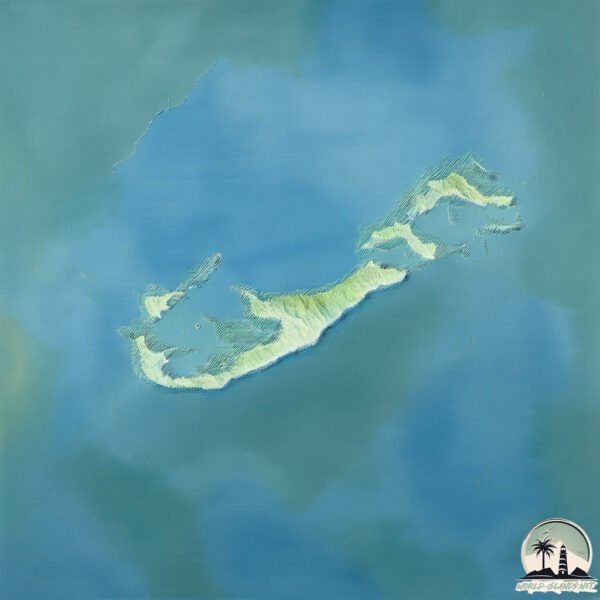Bermuda

Welcome to Bermuda, a Temperate island in the North Atlantic Ocean, part of the majestic Atlantic Ocean. This guide offers a comprehensive overview of what makes Bermuda unique – from its geography and climate to its population, infrastructure, and beyond. Dive into the details:
- Geography and Size: Explore the island’s size and location.
- Climate and Weather: Weather patterns and temperature.
- Topography and Nature: Uncover the natural wonders of the island.
- Infrastructure and Travelling: Insights on reaching, staying, and making the most of your visit.
- News and Headlines: Latest News.
Geography and size of Bermuda
Size: 40.3 km²
Coastline: 109.5 km
Ocean: Atlantic Ocean
Sea: North Atlantic Ocean
Continent: Seven seas (open ocean)
Bermuda is a Medium Island spanning 40 km² with a coastline of 110 km.
Archipel: –
Tectonic Plate: North America – Covers North America and parts of the Atlantic and Arctic Oceans, characterized by diverse geological features and varying levels of seismic activity.
The geographic heart of the island is pinpointed at these coordinates:
Latitude: 32.29415651 / Longitude: -64.78017837
Climate and weather of Bermuda
Climate Zone: Temperate
Climate Details: Humid Subtropical Climate
Temperature: Hot Summer
Climate Characteristics: With continuous rainfall and hot summers, this climate is common in some coastal regions, supporting diverse vegetation.
Topography and nature of Bermuda
Timezone: UTC-04:00
Timezone places: America/La_Paz
Max. Elevation: 48 m
Mean Elevation: 18 m
Vegetation: Evergreen Needleleaf Forest
Tree Coverage: 56%
The mean elevation is 18 m. The highest elevation on the island reaches approximately 48 meters above sea level. The island is characterized by Plains: Flat, low-lying lands characterized by a maximum elevation of up to 200 meters. On islands, plains are typically coastal lowlands or central flat areas.
Dominating Vegetation: Evergreen Needleleaf Forest
Dominated by evergreen coniferous trees such as pines and firs, which retain their needle-like leaves throughout the year. These forests are often found in cooler climates. Bermuda has a tree cover of 56 %.
Vegetation: 11 vegetation zones – Exceptionally Diverse Island
Islands with more than ten vegetation zones are among the most ecologically rich and varied in the world. These islands are akin to miniature continents, boasting an incredible array of ecosystems. The sheer range of habitats, from high peaks to deep valleys, rainforests to deserts, creates a mosaic of life that is unparalleled. They are crucial for conservation and ecological studies.
Infrastructure and Travelling to Bermuda
Does the island have a public airport? no.
There is no public and scheduled airport on Bermuda. The nearest airport is L.F. Wade International International Airport, located 3 km away.
Does the island have a major port? yes.
Bermuda is home to a major port. The following ports are situated on the island: HAMILTON.
The mean population of Bermuda is 1166 per km². Bermuda is Densely Populated. The island belongs to United Kingdom.
Continuing your journey, Nantucket is the next notable island, situated merely km away.
THIS IS THE SECRET OF LIFE ON BERMUDA ISLAND!!!



United Kingdom is classified as Developed region: G7: Group of Seven – Major advanced economies, including Canada, France, Germany, Italy, Japan, the United Kingdom, and the United States. The level of income is High income: OECD.
News – Latest Updates and Headlines from Bermuda
Stay informed with the most recent news and important headlines from Bermuda. Here’s a roundup of the latest developments.
Please note: The data used here has been primarily extracted from satellite readings. Deviations from exact values may occur, particularly regarding the height of elevations and population density. Land area and coastline measurements refer to average values at mean high tide.
